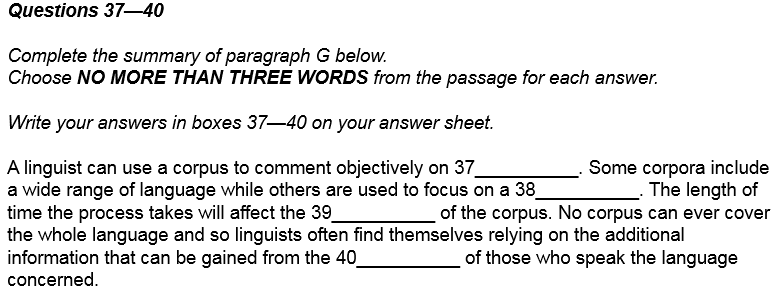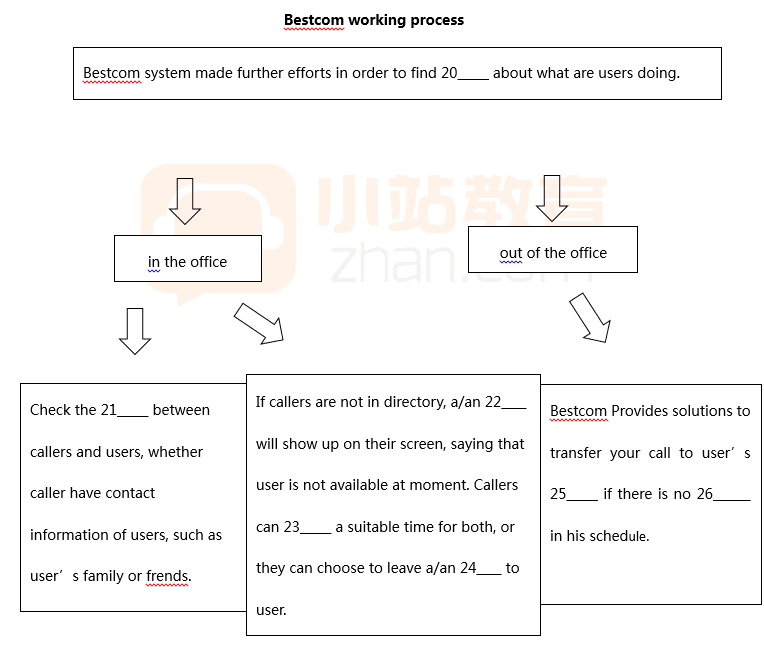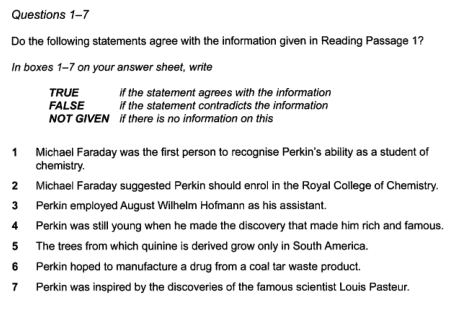備考雅思閱讀的5大問題 ,你占了幾?下面小編給大家帶來了備考雅思閱讀的5大問題,希望能夠幫助到大家,下面小編就和大家分享,來欣賞一下吧。
備考雅思閱讀的5大問題
問題一
盲目瘋狂刷題。以為閱讀題做的越多提升越快分數就會越高,陷入一種機械做題的狀態,什么題都做,雜而不精。
問題二
混亂記憶單詞。都說得詞匯者得閱讀,但是死記硬背不但不能提高詞匯量反而還會增加記憶的難度。只要弄明白哪些單詞是考試重點,重點突破考試詞匯,就算沒有足夠的時間去背4000個單詞,也能夠考到不錯的分數。
問題三
欠缺時間規劃。有些烤鴨喜歡慢慢做題,斟酌每一個細節,但是這樣一來1個小時就只能做完2篇文章。這里小航建議大家可以直接先看題,根據題目定位做題,可以有效提高速度。
問題四
糾結答案選項。在考試這種關鍵的時刻,大家還是可以考慮該猜就猜,學會舍棄,將精力放在有把握的考題上去。不要因為糾結而給自己造成過大壓力。
問題五
消極心態應試。在考試的時候難免會有心態問題,對自己缺乏自信,導致考場上緊張焦慮。而且一些烤鴨在考完聽力之后發現聽力很糟糕,隨之就完全影響了閱讀的成績。這樣是得不償失的!
8.5分高分經驗
那么到底如何才能克服這些問題拿下閱讀高分呢?來看看首戰雅思閱讀就拿下8.5分的某烤鴨給我們分享的高分經驗吧~
學習是一個越多積累越多收獲的過程,而在這個過程中,越努力,越幸運!一起來回顧大神的高分之路吧~
每天練習
備考的三個月里我每天做的練習只有閱讀,結果四項小分里成績最高的也當然是閱讀,可以說是付出什么,就收獲什么吧。做完閱讀時不僅要對答案,而且一定要認真看答案解析,了解每個問題可能的陷阱在哪里,也可以適當的學會舉一反三,例如自己反問自己,如果這個問題換一種問法,應該要選什么選項或者填什么,這樣子在我看來可能才算是把題做透做通了吧。
其實在做閱讀的時候肯定會有不認識的單詞,但一般不要立即查它是什么意思,主要慢慢培養自己一種“猜”的能力,這樣才能讓你在真正考試時,在碰到不認識單詞時,猜它的意思時會有一種特別的直覺和理解力,準確率往往也會比較高。做完閱讀后也不需要查每一個不認識的單詞,但是一定要查查閱讀中出現的高頻和核心詞匯,間接的驗證一下自己猜的是否準確。
模擬和真題
考前一天模擬,考試前一天做套真題,自己嚴格把握時間,把它當作真正考試一樣對待,其實這樣的模擬真題練習了平常也可以選擇性的多做幾次,但在考前一天做次模擬主要是為了培養自己的手感和考試的那種感覺,在第二天真正考試的時候才會有那種熟悉感,拿上筆時而沒有那種陌生和久違感。
解題技巧
老師課上講的那些技巧的確是比較有用的,平常做練習的時候需要熟記于心,學會應用,用多了熟能生巧了,考試自然能輕松應用了。考前可以抽出來20分鐘的時間再單純的回顧一下筆記,加深一些印象,像作文的某些高分核心句和詞匯,閱讀的一些注意之處,都可以考前看看,短時間記憶在考場上還是能發揮一定作用的。
應試心態
心態至少占30%的比例吧,越是緊張,或者越是在意、追求這次考試必須考出來什么什么樣的成績,反而會事與愿違吧,感覺心里已經有一些其他的雜念讓你無法百分之百的專心投入到考試中去了。越是輕松上陣狀態越好,成績也會相應更好吧。
雅思閱讀機經考試真題回憶及答案解析
一、 考試概述:
本次考試的文章兩篇舊題一篇新題,第一篇是諾貝爾的人物傳記,第二篇是講了一種叫howler的猴子的生活習性,第三篇是講澳大利亞博物館的特點,題目方面難度較大的List of Headings沒有出題,但是其它配對題出題量較大共15道題目,對考生的做題速度要求還是比較高的。
二、具體題目分析
Passage 1:
題目:Alfred Nobel
題型:判斷題6 +填空題7
新舊程度:舊題
文章大意:講了Alfred Nobel的生平以及他一生做的貢獻
參考文章:
Alfred Nobel
The man behind the Nobel Prize
A Since 1901, the Nobel Prize has been honoring men and women from all comers of the globe for outstanding achievements in physics, chemistry, medicine, literature, and for work in peace. The foundations for the prize were laid in 1895 when Alfred Nobel wrote his lost will, leaving much of his wealth to the establishment of the Nobel Prize.
B Alfred Nobel was born in Stockholm on October 21. 1833. His father Immanuel Nobel was an engineer and inventor who built bridges and buildings in Stockholm. In connection with his construction work Immanuel Nobel also experimented with different techniques for blasting rocks. Successful in his industrial and business ventures, Immanuel Nobel was able, in 1842, to bring his family to St. Petersburg. There, his sons were given a first class education by private teachers. The training included natural sciences, languages and literature. By the age of 17 Alfred Nobel was fluent in Swedish, Russian, French, English and German. His primary interests were in English literature and poetry as well as in chemistry and physics. Alfred's father, who wanted his sons to join his enterprise as engineers, disliked Alfred's interest in poetry and found his son rather introverted.
C In order to widen Alfred's horizons his father sent him abroad for further training in chemical engineering. During a two year period Alfred Nobel visited Sweden, Germany. France and the United States. In Paris, the city he came to like best, he worked in the private laboratory of Professor T. J. Pelouze, a famous chemist. There he met the young Italian chemist Ascanio Sobrero who, three years earlier, had invented nitroglycerine, a highly explosive liquid. But it was considered too dangerous to be of any practical use. Although its explosive power greatly exceeded that of gunpowder, the liquid would explode in a very unpredictable manner if subjected to heat and pressure. Alfred Nobel became very interested in nitroglycerine and how it could be put to practical use in construction work. He also realized that the safety problems had to be solved and a method had to be developed for the controlled detonation of nitroglycerine.
D After his return to Sweden in 1863, Alfred Nobel concentrated on developing nitroglycerine as an explosive. Several explosions, including one (1864) in which his brother Kmil and several other persons were killed, convinced the authorities that nitroglycerine production was exceedingly dangerous. They forbade further experimentation with nitroglycerine within the Stockholm city limits and Alfred Nobel had to move his experimentation to a barge anchored on Lake Malaren. Alfred was not discouraged and in 1864 he was able to start mass production of nitroglycerine. To make the handling of nitroglycerine safer Alfred Nobel experimented with different additives. He soon found that mixing nitroglycerine with kieselguhr would turn the liquid into a paste which could be shaped into rods of a size and form suitable for insertion into drilling holes. In 1867 he patented this material under die name of dynamite. To be able to detonate the dynamite rods he also invented a detonator (blasting cap) which could be ignited by lighting a fuse. These inventions were made at the same time as the pneumatic drill came into general use. Together these inventions drastically reduced the cost of blasting rock, drilling tunnels, building canals and many other forms of construction work.
E The market for dynamite and detonating caps grew very rapidly and Alfred Nobel also proved himself to be a very skillful entrepreneur and businessman. Over the years he founded factories and laboratories in some 90 different places in more than 20 countries. Although he lived in Paris much of his life he was constantly traveling. When he was not traveling or engaging in business activities Nobel himself worked intensively in his various laboratories, first in Stockholm and later in other places. He focused on the development of explosives technology as well as other chemical inventions, including such materials as synthetic rubber and leather, artificial silk, etc. By the time of his death in 18% he had 355 patents.
F Intensive work and travel did not leave much time for a private life. At the age of 43 he was feeling like an old man. At this time he advertised in a newspaper “Wealthy, highly-educated elder gentleman seeks lady of mature age, versed in languages, as secretary and supervisor of household. " The most qualified applicant turned out to be an Austrian woman. Countess Bertha Kinsky. After working a very short time for Nobel she decided to return to Austria to marry Count Arthur von Suttner. In spite of this Alfred Nobel and Bertha von Suttner remained friends and kept writing letters to each other for decades. Over the years Bertha von Suttner became increasingly critical of the arms race. She wrote a famous book, Lay Down Your Arms and became a prominent figure in the peace movement. No doubt this influenced Alfred Nobel when he wrote his final will which was to include a Prize for persons or organizations who promote peace. Several years after the death of Alfred Nobel, the Norwegian Storting (Parliament) decided to award the 1905 Nobel Peace Prize to Bertha von Suttner.
G Alfred Nobel died in San Remo, Italy, on December 10, 1896. When his will was opened it came as a surprise that his fortune was to be used for Prizes in Physics, Chemistry. Physiology or Medicine, Literature and Peace. The executors of his will were two young engineers, Ragnar Sohlman and Rudolf Lilljequist. They set about forming the Nobel Foundation as an organization to take care of the financial assets left by Nobel for this purpose and to coordinate the work of the Prize-Awarding Institutions. This was not without its difficulties since the will was contested by relatives and questioned by authorities in various countries.
H Alfred Nobel's greatness lay in his ability to combine the penetrating mind of the scientist and inventor with the forward-looking dynamism of the industrialist. Nobel was very interested in social and peace-related issues and held what were considered radical views in his era. He had a great interest in literature and wrote his own poetry and dramatic works. The Nobel Prizes became an extension d a fulfillment of his lifetime interests.
參考答案:
判斷題:
1. The first Nobel Prize was awarded in 1895. FALSE
2. Nobel's father wanted his son to have better education than what he had had. NOT GIVEN
3. Nobel was an unsuccessful businessman. FALSE
4. Bertha von Suttner was selected by Nobel himself for the first peace prize. FALSE
5. The Nobel Foundation was established after the death of Nobel. TRUE
6. Nobel's social involvement was uncommon in the 1800’s. TRUE
填空題:
7. chemical engineering
8. Ascanio Sobrero
9. gunpowder
10. Stockholm
11. detonator
12. pneumatic drill
13. cost
(答案僅供參考)
雅思聽力小范圍預測:Section Two
Section Two
場次 20160813 2011097 20110813 20100520 20091205 2006
場景 旅游介紹
題型 填空 4 單選 2 配對 4
內容概述 關于 mitchell island 的 travelling advice
選擇 2
1. 可以坐什么交通工具到小島上? A
A. plane B. ferry C. hovercraft C. hover craft 為干擾項是,但是他又說這個項目被
取消了還是怎么了,所以 不能選。
2. 第二個選擇題是問坐出租車需要彭彭提請注意什么?選 B.
A. uncomfortable B. unroadworth C. unregistered
配對 4
3-6.是 Matching 題,要求分別把 E-east coast;N-north coast;W-west coast 對
應到相關服務的選項上
3. 第一個服務好像是什么餐飲之類的,self-cafeteria restaurant 這一項填 E
4. natural walk to amusing park,填 N
5. shop,不用填
6. 第四個高爾夫課程 Golf Course,填 N
填空 4
7. tropical diseases
8. 要帶 bottles of water
9. snakes 原文:因為說是東海岸有危險動物,好像是例如西海岸的蛇
10. 島上有犯罪記錄的是 monkeys 原文:這里提到過的“犯罪”是誰干的,
說是本地的猴子為了找食物
雅思聽力小范圍預測:Section Three
Section Three
場次 20110111 20100605
題型 填空 7 單選 3
內容概述 男教授和一男一女兩個學生討論語言學習問題
單選 3
1:問女生學習中遇到的問題。
A. German for science is too difficult.
B. she doesn’t grasp the skill to learn independently
C. she is too busy to learn
2. What did Ivan do in the library?
A. sort out the timetable
B. read newspapers
C. send e-mail
3: 兩人學習中共同的問題。
選 A. too many people in the library
備考雅思閱讀的5大問題相關文章:
★ 雅思閱讀分數上不去要如何備考
★ 雅思備考寫作如何做到精準審題
★ 雅思備考干貨:三周完勝雅思寫作備考方案
★ 3個月備考期的雅思閱讀復習經驗
★ 雅思口語備考高分技巧分享
★ 雅思閱讀備考必知問題全面解答
★ 雅思歷年真題回顧及其思路解析
★ 雅思寫作目標5.5分重點練習什么
★ 雅思A類閱讀備考做到這5點才是基礎
★ 雅思精讀到底怎樣操作最有效
下一篇:雅思閱讀高分技巧之把握好邏輯關系






